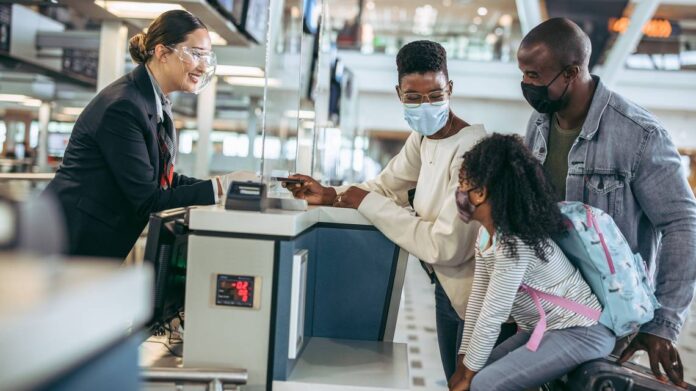Taking extra steps can help to prevent airborne illness, like wearing a mask in crowded spaces.
Jacob Lund, Shutterstock
Beginning in March 2020, worldwide lockdowns and travel restrictions limited both domestic and international air travel significantly. However, now that most of the world is opening back up (with China as the exception), the travel bug has bitten us like never before. Travel spending is up 3% over pre-pandemic levels, according to the U.S. Travel Association. It’s safe to say that those of us who have curtailed leisure travel are ready to get moving again! But how do we stay safe and healthy as we board the air-travel saddle? Here are five helpful travel health tips if you plan on flying this season.
Stay hydrated
All of our organs, including our immune systems, need water to operate at an optimal level because it helps battle germs. Unfortunately, airplane travel is dehydrating, mainly because of the low air pressure and decreased humidity levels in the cabin, which cause moisture to evaporate more quickly from the body. When preparing to fly, think about upping your water intake, especially on long-haul flights. Remember that while it is enticing to drink alcohol during flights (especially on those overseas ones where alcoholic beverages are often complimentary), this can exacerbate dehydration. So if you do choose to imbibe, drink a glass of water or two after every alcoholic beverage.
Maintain good hand hygiene
We come into contact with many germs via our hands, which then come into contact with our noses and mouths. This is not really the case for pathogens that are spread through respiratory passages (like COVID-19). But you certainly don’t want to get some other illness (like the very contagious and dreaded pink eye due to poor hand hygiene during your travels! Keep that in mind when touching any surfaces while you travel. While washing hands frequently with soap (for at least 20 seconds) is the best way to stave off those germs, keeping a small bottle of hand sanitizer (with at least 60% alcohol content) is the next best thing. Using hand sanitizer before and after exchanging items on the plane will go a long way in keeping you and others safe.
Get vaccinated
Although the world is starting to operate more and more like the pandemic is over, the fact is that it is still present, albeit with far fewer cases of COVID-19 than one year ago. It’s important to note that though COVID-19 vaccines will not prevent you from getting the virus, they are effective in protecting you from getting seriously ill, being hospitalized and dying. Read more about staying up to date with your COVID-19 vaccination schedule and keeping your immunity levels high.

To mask or not to mask?
Let’s face it, most of us are tired of mask-wearing. That said, traveling increases the risk of catching certain illnesses simply because we are coming into contact with many more people than in our regular daily lives. If the thought of being on an airplane with hundreds of people sends you into a fit of germophobia, you are not alone. However, rest assured that the air filtration system in plane cabins is devised to zap the majority of airborne pathogens and is much cleaner than one might think. Of course the filtration system is often not activated during boarding and upon landing. So, if you choose not to wear a mask throughout the flight, consider wearing one during boarding and disembarking, as well as when you’re in close proximity to people standing in check-in and security lines.
Get your body moving
Some of us use long flights to catch up on sleep. While understandable, it is important to get up every once in a while and walk around. Why? Because cabin air conditions and prolonged sitting causes blood to pool in your leg veins. It also causes fluid retention in your feet. And, although this isn’t necessarily life-threatening, if you have swelling that persists hours after disembarking the plane or swelling only in one leg, seek medical attention immediately. If you have an increased risk of blood clots because you recently had surgery or you take birth control pills, let your medical provider know that you are planning to fly. In cases such as these, they might prescribe medication or compression stockings to decrease the risk of developing a blood clot while flying.
This story was originally published December 15, 2022 9:00 AM.














